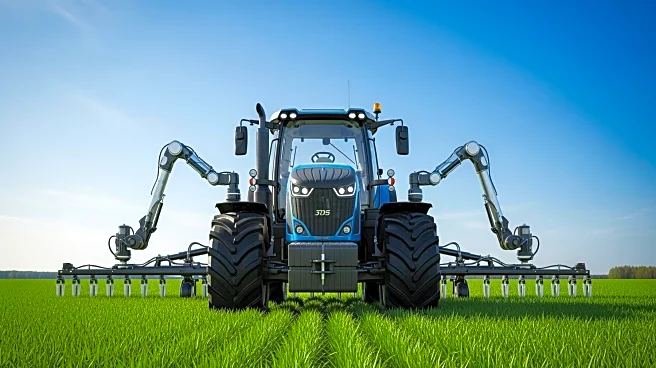What's Happening?
New Holland, a prominent brand under CNH Industrial, is showcasing its latest advancements in agricultural technology at FIRA USA 2025, an event dedicated to agricultural robotics and automation. The event, held in Woodland, California, from October 21
to 23, gathers farmers, industry leaders, startups, scientists, and investors to explore the future of eco-conscious farming. New Holland is emphasizing its commitment to sustainable farming practices through innovations that enhance productivity while reducing environmental impact. A highlight of their showcase is the T4.120F specialty tractor equipped with the Raven Air Blast Sprayer Kit, designed for vineyards and specialty crops. This system aims to improve spraying practices by eliminating application overlaps and skips, increasing daily coverage by up to 20%, and reducing crop protection input use by up to 10%. These advancements are intended to lower chemical usage, reduce waste, and provide cost savings for growers, aligning with environmentally responsible agriculture.
Why It's Important?
The introduction of smart farming technologies by New Holland at FIRA USA 2025 is significant for the agricultural industry as it addresses the growing need for sustainable farming practices. By reducing chemical usage and waste, these innovations contribute to environmental conservation and promote healthier ecosystems. The economic benefits, such as cost savings for farmers, are also crucial as they can enhance the profitability and viability of farming operations. This development reflects a broader trend in agriculture towards precision farming and automation, which can lead to more efficient resource use and improved crop yields. As the industry faces challenges related to climate change and resource scarcity, such technologies are vital for ensuring long-term sustainability and food security.
What's Next?
Following the showcase at FIRA USA 2025, New Holland is likely to continue developing and refining its smart farming technologies to further enhance their effectiveness and accessibility to farmers. The positive reception of these innovations may encourage other agricultural equipment manufacturers to invest in similar technologies, fostering a competitive market focused on sustainability. Stakeholders, including farmers and environmental groups, may advocate for wider adoption of these practices, potentially influencing agricultural policies and regulations. As these technologies become more integrated into farming operations, ongoing research and collaboration among industry leaders, scientists, and policymakers will be essential to address emerging challenges and opportunities in sustainable agriculture.
Beyond the Headlines
The advancements presented by New Holland at FIRA USA 2025 could have deeper implications for the agricultural sector, including ethical considerations related to the use of automation and robotics in farming. As these technologies become more prevalent, discussions around the impact on labor markets and the role of human workers in agriculture may arise. Additionally, the shift towards precision farming and reduced chemical usage could influence consumer perceptions and demand for sustainably produced food, potentially driving changes in market dynamics and food labeling standards. Long-term, these innovations may contribute to a cultural shift towards more environmentally conscious farming practices, influencing how agriculture is perceived and valued in society.

















